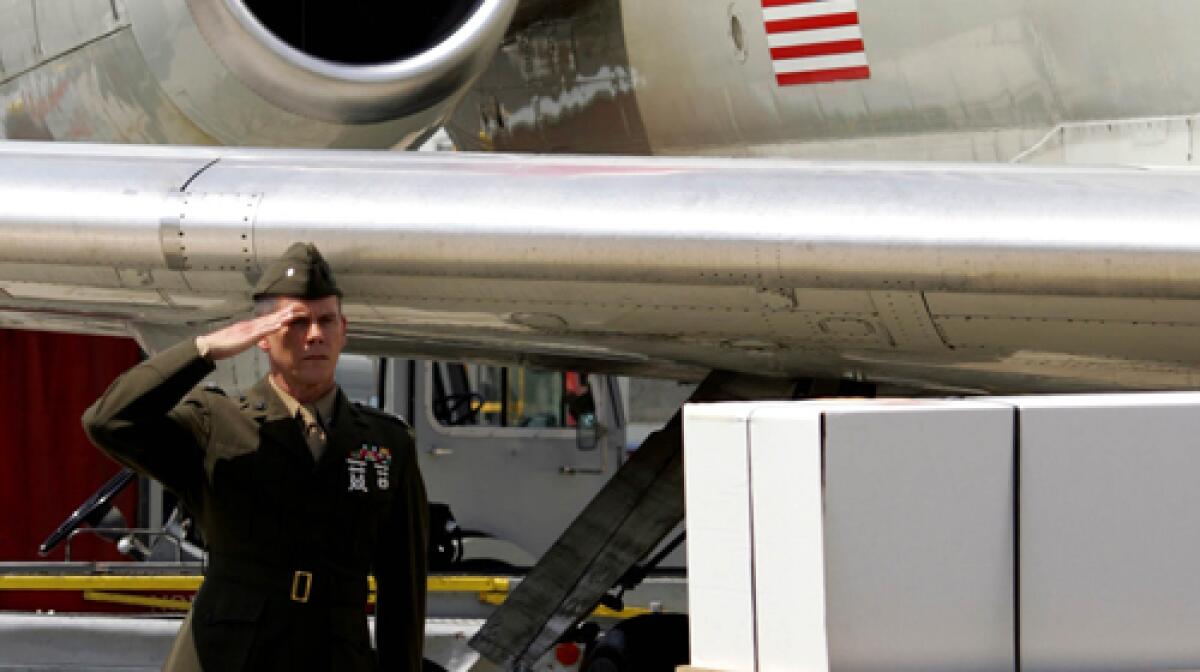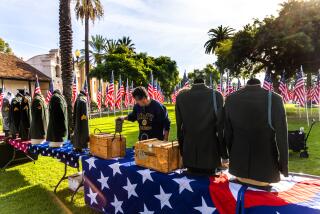‘Taking Chance:’ A tale not of war, but honor and goodness

During the Persian Gulf war in 1991, Michael Strobl was a lieutenant in a Marine artillery unit in the thick of the action.
By the time the Marines led the U.S. assault into Iraq in 2003, Strobl had been promoted to lieutenant colonel and had a desk job crunching manpower numbers at Quantico, Va.
Nagged by a sense that he should be at the front rather than behind a desk, Strobl volunteered as a military escort for a Marine killed near Ramadi. Strobl’s assignment was to accompany the casket of Pvt. Chance Phelps from the military mortuary at Dover, Del., to Phelps’ hometown in Wyoming for burial.
Phelps, 19, assigned to the Twentynine Palms-based 3rd battalion, 11th Marine regiment, was killed when his convoy was attacked on Good Friday, 2004.
When his escort duty was finished, Strobl wrote about the emotionally powerful experience of acting as a one-man honor guard: of watching the reverential care taken by mortuary personnel in preparing the bodies, of the respect shown by average Americans for the fallen, and of the grief and courage of the Phelps’ family.
From that essay has come “Taking Chance,” an HBO movie Saturday starring Kevin Bacon as Strobl and directed by Ross Katz, whose credits include producing the 2003 film “Lost in Translation,” with Bill Murray as a depressed movie star, and executive producing HBO’s “The Laramie Project,” about the homophobic murder of a gay college student.
“Taking Chance” is profoundly about the Iraq war and the young men and women who have made the ultimate sacrifice. But yet it is not an “Iraq movie.” The film neither supports nor opposes the foreign policy that sent Phelps to Iraq.
Katz said he initially was uninterested in making a movie about Iraq. Then he read Strobl’s essay and realized it was more about universal topics than about a specific war at a specific time.
“When you’re talking about the loss of someone’s child, there nothing political about it,” Katz said. “This is not a political film.”
In his essay, Strobl marveled at the positive response of airline personnel and passengers and others when they learned he was on escort duty.
“I hope other people see that: the goodness that’s out there,” said Strobl, now retired from the Marine Corps and working at the Pentagon. “We all see that from time to time, but I experienced it in a concentrated, intense manner.”
The movie, Strobl said, “is not about Iraq, it’s about America.”
Bacon, who has played military officers in “Apollo 13” and “A Few Good Men,” said he was drawn to the story of Strobl as “a guy struggling with a lot of internal emotions.” Much of the acting, Bacon said, is done with his eyes and not with dialogue.
The Department of Defense provided assistance so that the scenes at the Dover mortuary are accurate to the smallest detail: cleaning the bodies and possessions, finding the right dress uniform and medals, the honors rendered as the bodies depart for the airport.
“Taking Chance” may be the first glimpse most Americans have had of the process that has brought nearly 5,000 service personnel back from Iraq and Afghanistan. The military bans photography of the flag-draped caskets returning to Dover Air Force Base although Defense Secretary Robert Gates said recently that the policy, instituted in 1991, is being reviewed.
On this issue, the actor and the former Marine disagree. Bacon would like to see the Department of Defense drop the ban on photography. Strobl feels the privacy of the families needs to continue to be safeguarded.
The emotional high point of “Taking Chance” comes on the night before Phelps’ funeral. Strobl goes to the local VFW hall and meets with Phelps’ friends and a few former Marines, including a Korean war veteran played by Tom Aldredge.
The taciturn Strobl admits his feeling of guilt over staying safely in a stateside billet while Marines are fighting the nation’s new enemy. Aldredge cuts him short.
“You brought Chance home,” he says. “You’re his witness now. Without a witness, they just disappear.”
That, Katz said, is the point of “Taking Chance.”
“We’re all bearing witness now, for all of them,” he said.
More to Read
The complete guide to home viewing
Get Screen Gab for everything about the TV shows and streaming movies everyone’s talking about.
You may occasionally receive promotional content from the Los Angeles Times.






